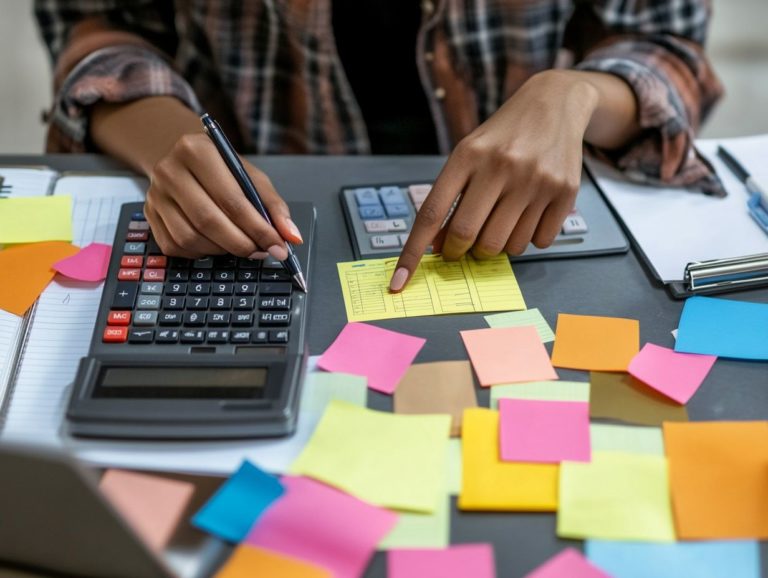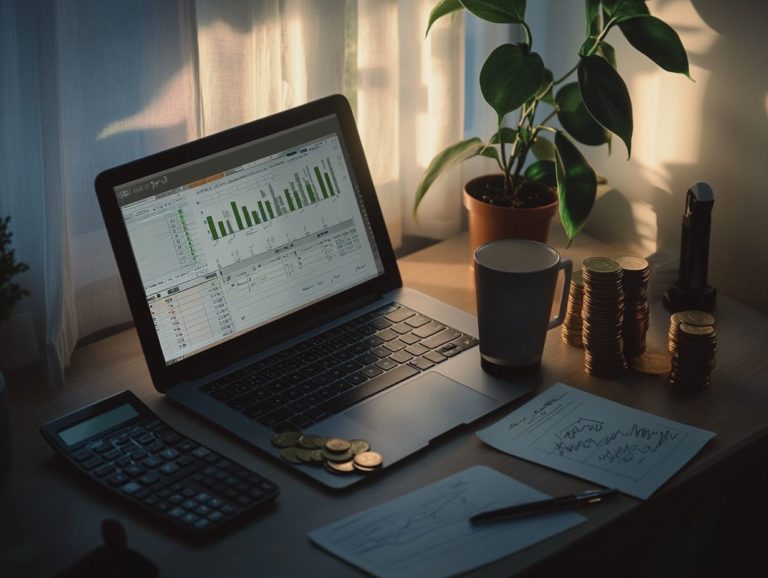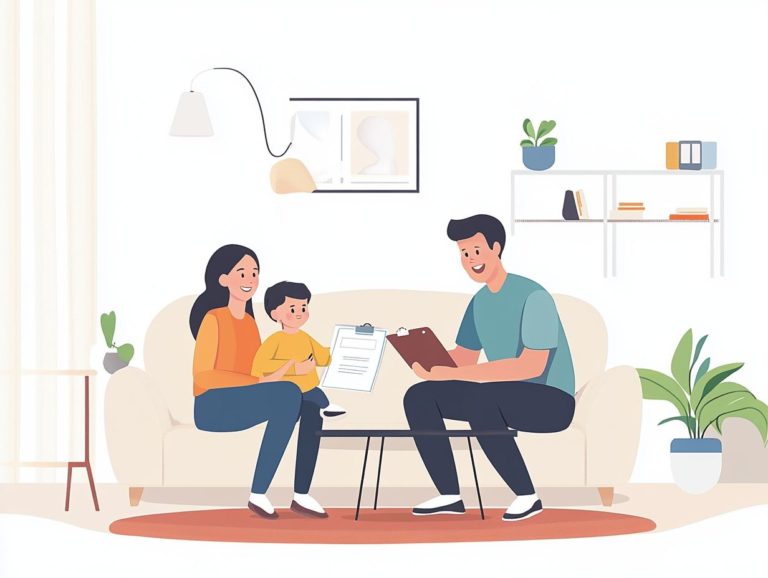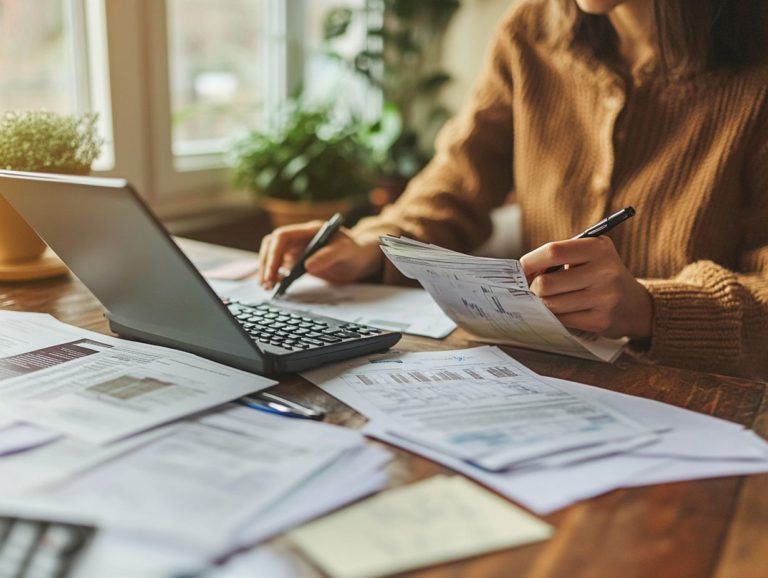How to Safer Credit Card Usage?
Credit cards can elevate your purchasing power, but they also come with challenges. Let s explore the world of credit cards and discover how they can work for you!
This article uncovers the mechanics of credit cards, revealing their benefits and potential pitfalls. You will learn best practices for safe usage, effective strategies for managing debt, and viable alternatives if credit cards don t suit your financial needs.
By the end, you ll be equipped to navigate the intricate landscape of credit cards with confidence and clarity.
Contents
Key Takeaways:
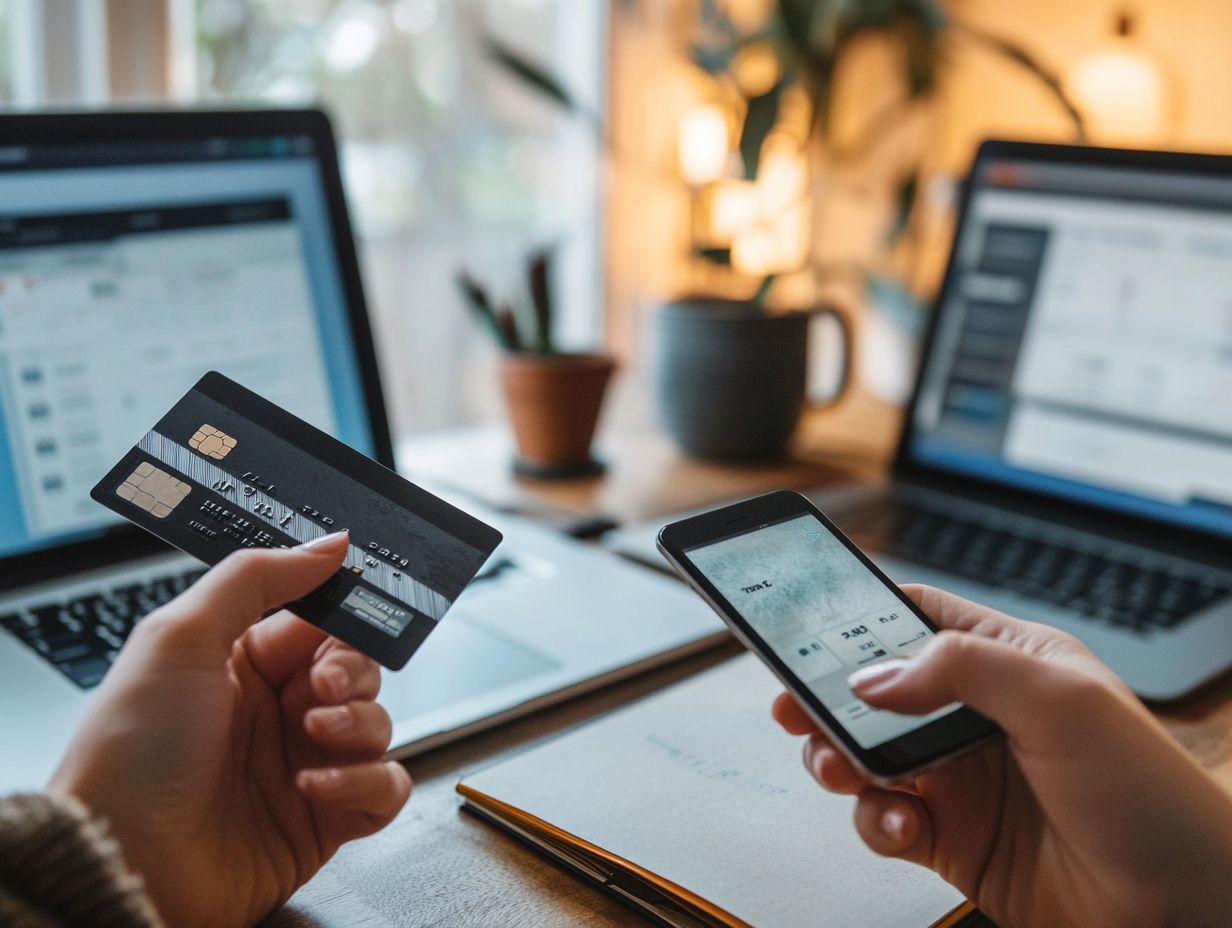
- Understand how credit cards work to make smart decisions.
- Enjoy rewards and build credit while staying aware of risks.
- Follow best practices to use credit cards safely.
- Create a plan to manage credit card debt.
- Consider alternatives like debit cards or cash.
Understanding Credit Cards
Grasping the nuances of credit cards is vital for mastering personal finance management. These money tools enable you to make online purchases, build a robust credit history, and explore various payment options.
Understanding how they operate within the complex realm of financial institutions is crucial. This includes knowing the terms and conditions that govern their use and the implications for your credit utilization, which refers to the amount of credit you use compared to your total credit limit.
What are Credit Cards and How do They Work?
Credit cards are money tools issued by banks or credit unions, allowing you to borrow funds for online shopping and in-store purchases up to a limit. You need to repay these funds with interest if you don t pay in full by the due date.
These tools often come with advanced features, like EMV chips, enhancing security by generating unique transaction codes to help prevent fraud. When you shop online, you simply enter your credit card details, including the card number and expiration date, to finalize your purchase.
In this digital marketplace, keeping a healthy payment history is crucial. It influences your credit score and can affect future credit limits. Understanding these components enables you to make informed purchasing decisions and fosters responsible credit usage.
Benefits and Risks of Credit Card Usage
Credit cards offer numerous advantages, including robust fraud protection and comprehensive purchase safeguards. However, they come with risks like identity theft and exorbitant interest rates on unpaid balances.
This duality underscores the importance of understanding both the benefits and the pitfalls before deciding to use credit cards.
Advantages of Credit Cards
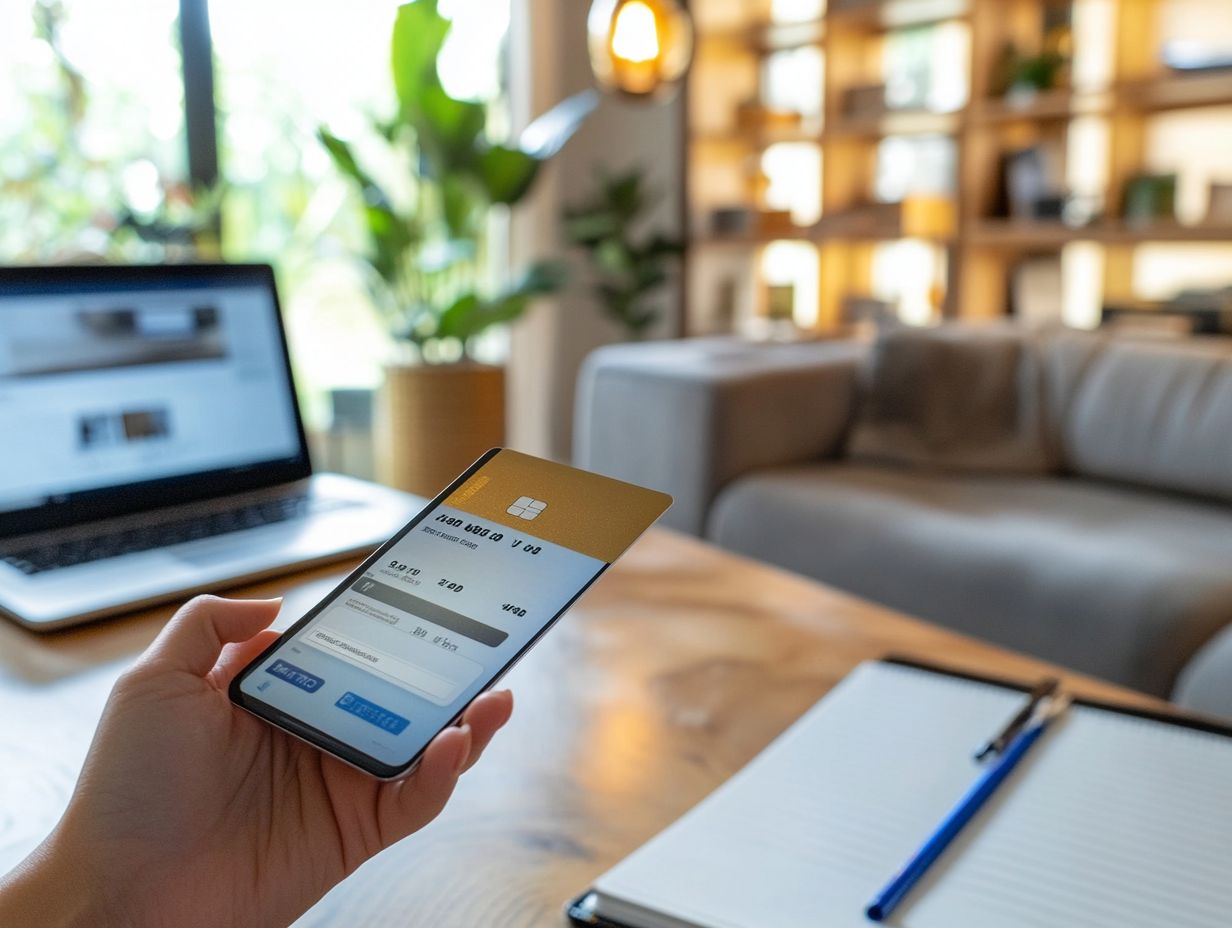
The advantages of credit cards are compelling. They offer rewards programs, enhanced online shopping experiences, and built-in fraud alerts, providing peace of mind with every transaction especially when using digital wallets like Apple Pay and Google Pay.
These benefits simplify your purchases and help build a robust credit history, essential for future financial opportunities. Beyond earning cashback rewards on your everyday spending, many credit cards offer protections against unauthorized charges.
Their impressive security features, including monitoring for suspicious activity, ensure you can shop safely, both online and in stores.
Integrating your credit cards with digital wallets makes the payment process seamless, allowing you to transact swiftly and conveniently, no matter where you are.
Now that you re equipped with knowledge about credit cards, take charge of your financial future today!
Potential Dangers and How to Avoid Them
The potential dangers of credit card usage include credit card fraud, unauthorized transactions, and suspicious charges. All of these can significantly impact your financial health if not addressed promptly.
It s urgent that you regularly monitor your accounts to catch discrepancies early. Every moment counts when it comes to unauthorized purchases!
To safeguard against these threats, prioritize regular account monitoring to quickly identify unauthorized purchases and take necessary actions.
Setting up alerts for transactions provides real-time notifications, allowing you to respond swiftly to any suspicious charges. Implementing two-factor authentication, a security feature that requires two forms of identification to access your account, adds another layer of security, making it much more challenging for unauthorized users to access your accounts.
Being proactive about these strategies helps mitigate the potential risks associated with credit card use, enabling you to enjoy the convenience of your cards with greater peace of mind.
How to Use Credit Cards Safely
Using credit cards safely requires implementing strict measures. Employ robust security software, craft unique passwords, and ensure a secure connection during online purchases.
These steps are essential for safeguarding your personal information against online thieves, especially when using public Wi-Fi networks.
Best Practices for Secure Usage
Implementing best practices for secure credit card usage is crucial. Start by enabling two-factor authentication and setting up transaction notifications.
Use antivirus software to detect and address potential threats to your accounts. To enhance your overall security, make it a habit to regularly update your security settings and passwords, ensuring they remain strong and unique.
Stay vigilant by reviewing transaction notifications for any unauthorized activity; this allows you to take swift action if something seems off. Always connect through secure connections, especially when shopping online, to protect yourself from data breaches.
By adopting these measures, you can significantly mitigate the risks associated with online transactions, creating a much safer shopping experience.
Tips for Managing Credit Card Debt

Effectively managing credit card debt is essential for preserving your financial well-being. It necessitates a sharp understanding of credit utilization rates and ensuring timely payment of your dues.
Exploring strategic options like balance transfers can also minimize interest costs. By mastering these elements, you can take control of your financial landscape and pave the way for a more secure future.
Strategies for Paying Off Balances
Strategies for paying off credit card balances include making payments that exceed the minimum and prioritizing high-interest debts.
Utilize transaction alerts to keep a close eye on your spending, including setting payment reminders for due dates.
Taking proactive steps not only helps reduce credit card debt but also cultivates better financial habits. One highly effective method is to set up automatic payments, ensuring bills are paid on time and sidestepping those pesky late fees that can deepen your debt.
Leveraging services offered by financial institutions, such as budgeting tools and debt management programs, grants you invaluable insights into your spending patterns. By regularly reviewing your statements and maintaining open communication with lenders about your payment history, you can craft a more manageable debt repayment plan.
This ultimately paves the way to financial stability and improved credit scores.
Alternatives to Credit Cards
While credit cards may reign supreme for online purchases, you ll find that alternatives like digital wallets, contactless cards, and other payment options provide you with flexible and often secure methods to transact without the burden of accruing debt.
Other Payment Options to Consider
Explore payment options like digital wallets, such as Apple Pay and Google Pay. These platforms streamline online purchases and keep your information safe.
They protect your sensitive data with features like biometric authentication and temporary card numbers. Shop with peace of mind, knowing your information is shielded from fraud.
The user-friendly interfaces make transactions quick and easy. Focus on enjoying your shopping experience without worrying about security risks!
Frequently Asked Questions
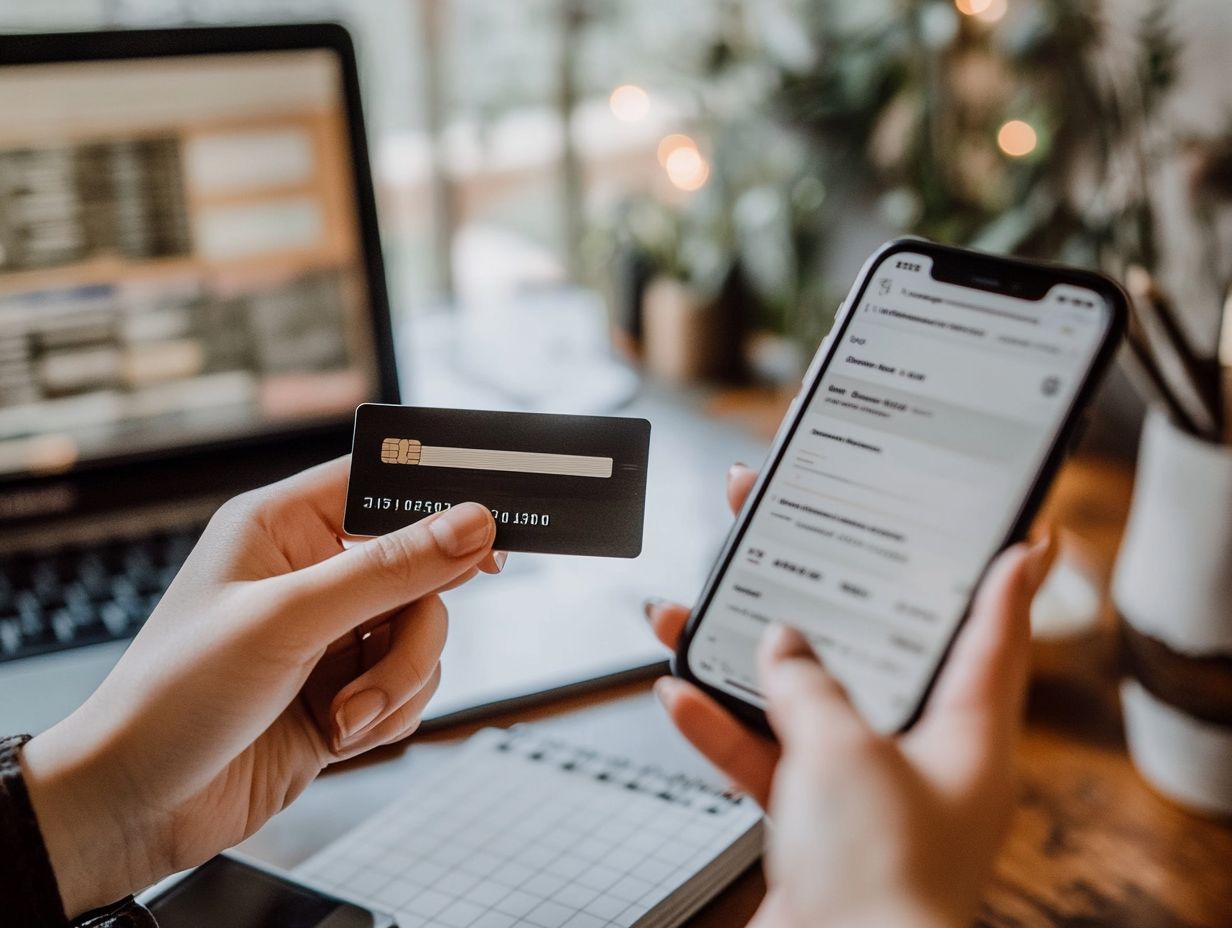
What is a credit card?
A credit card is a plastic card from a bank or financial institution. It allows you to borrow money to pay for purchases.
How can I use a credit card safely?
Keep your credit card information private. Regularly check your statements for unauthorized charges.
What should I do if my credit card is lost or stolen?
Contact your credit card company immediately to report a lost or stolen card. They will cancel it and issue a new one.
Is it safe to use my credit card online?
It s generally safe if you use reputable websites. Look for a secure lock symbol in the browser and ensure the URL starts with “https”.
What is the difference between a credit card and a debit card?
A credit card lets you borrow money, while a debit card takes money directly from your bank account. You must repay borrowed amounts with a credit card.
Can I dispute a charge on my credit card?
Yes, you can dispute any incorrect or unauthorized charges. Your credit card company will investigate and remove incorrect charges.


